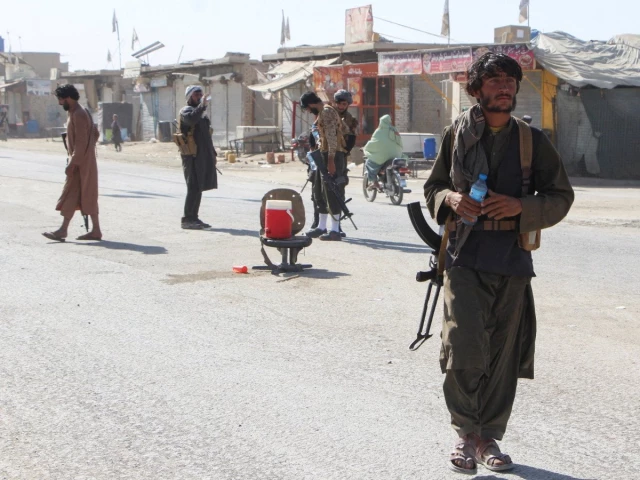Pakistan demands ‘concrete, verifiable steps’ from Kabul to eliminate cross-border terrorism during Istanbul talks
Afghan Taliban patrol near the Afghanistan-Pakistan border in Spin Boldak, Kandahar province on October 15. Photo: Reuters
Pakistan has presented its final position to the Afghan Taliban regime during the second round of talks, strongly rejecting what it called their continued patronage of cross-border attacks and terrorism, terming such activities as ‘unacceptable’, security sources said.
The ongoing talks – mediated by Turkiye and Qatar – aim to prevent a relapse into conflict following clashes between border forces in the two countries earlier this month, the worst since the Taliban’s takeover of Kabul in 2021.
According to security sources, the Pakistani delegation made it clear during Sunday’s session that the Taliban’s support for militant groups operating from Afghan soil cannot be tolerated. Islamabad, they said, demanded ‘concrete and verifiable steps’ from Kabul to eliminate cross-border terrorism.
Read: 25 terrorists killed as forces thwart Afghan border infiltration, five soldiers martyred: ISPR
“On the contrary, the arguments presented by the Taliban are illogical and contrary to the reality on the ground,” a security source said. “It appears that the Taliban are following someone else’s agenda, which is not in the interests of stability in Afghanistan, Pakistan or the wider region.”
Officials added that further progress in the talks will depend on a positive and constructive attitude from the Afghan Taliban. Although a final outcome is yet to come, sources indicated that the Taliban remains reluctant to take action against Fitna al-Khwarij.
Pakistan’s delegation presented what officials described as substantial evidence of the presence of Fitna al Khwarij and Fitna al Hindustan on Afghan soil, including evidence that their leadership has been sheltered by the Afghan Taliban.
Officials further noted that the Taliban, as a non-state actor itself, appears unable to understand the consequences of supporting other non-state groups at the expense of formal relations with Pakistan – a country that has long been a benefactor of the Afghan people.
Read more: Pakistan presents anti-terror plan for Afghanistan in Istanbul talks
“The Pakistani delegation attended the talks with full clarity, presented core issues with solid evidence and refused to deviate from the discussions,” a security source said. “Pakistan maintained its position that it will not engage with Fitna al-Khwarij and that the Afghan Taliban must withdraw their support for the leadership of all proxies.”
Officials also highlighted that the Taliban’s refusal to respond to Pakistan’s demands – which have been endorsed by Turkiye, Qatar, Saudi Arabia and the United Arab Emirates – indicates that their current course takes precedence over the consensus of international interlocutors. Sources suggested that this agenda may be influenced by India, which is reportedly seeking to re-establish its foothold in Afghanistan.
Security officials warned that a prolonged stalemate could force Pakistan to take unilateral action against the Tehreek-e-Taliban Pakistan (TTP), a move that could entail significant costs for both countries. “Afghanistan too would face greater consequences for which the Taliban would be responsible,” a source warned.
Officials stressed that it would be in the interest of both the people of Afghanistan and Pakistan, as well as regional stability, for the Taliban to take a practical and cooperative approach and act decisively against proxy groups operating from Afghan territory.
Doha lecture
The Istanbul talks follow the agreement between Pakistan and Afghanistan for an immediate ceasefire during Doha talks after a week of intense border clashes – the worst since the Taliban seized power in Kabul in 2021.
The ceasefire ‘has been concluded’, Pakistan’s Defense Minister Khawaja Asif wrote on X last Sunday, saying both sides would meet again on October 25 in Istanbul to discuss ‘detailed issues’.
The Pakistani delegation, led by Khawaja Asif, includes other senior officials. On the Afghan side, the talks were led by Acting Defense Minister Mullah Yaqoob, accompanied by other representatives.
Also read: US sees opportunity to cement bilateral strategic ties with Pakistan: Rubio
Pakistani officials raised the issue of cross-border terrorist attacks originating in Afghanistan, pointing in particular to groups such as the Gul Bahadur faction and the Tehreek-e-Taliban Pakistan (TTP). Islamabad maintains that these groups have been involved in several deadly incidents in Pakistan in recent months.
Sources familiar with the talks said Pakistan presented a ‘single point agenda’ focused on eliminating the terror networks. “Pakistan has made it clear that the Afghan government must root out terrorist organizations and their hideouts,” sources said.
Taliban spokesman Zabihullah Mujahid said in a statement that the parties had agreed to a full and meaningful ceasefire.
Tensions escalated after unprovoked firing by the Afghan Taliban regime
Tensions along the Pakistan-Afghanistan border escalated on October 12 when clashes erupted after the Afghan Taliban regime opened unprovoked fire at several locations in Khyber-Pakhtunkhwa (KP) and Balochistan, prompting a swift and forceful response by the Afghan army, which killed several Afghan soldiers and dozens of Pakistani soldiers killed.
The coordinated attack originated from several key sectors including Angoor Adda, Bajaur, Kurram, Dir, Chitral in Khyber-Pakhtunkhwa and Baramcha in Balochistan. The firing, security sources said, was aimed at facilitating the illegal entry of Khwarij – the state-designated name for the outlawed TTP – into Pakistani territory.
“The Pakistan Army responded immediately and decisively,” security sources said. “The counteroffensive effectively targeted and destroyed several Afghan positions on the border. Dozens of Afghan soldiers and Khwarij were killed in retaliatory fire”.



